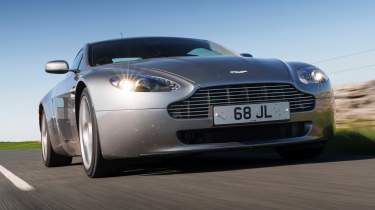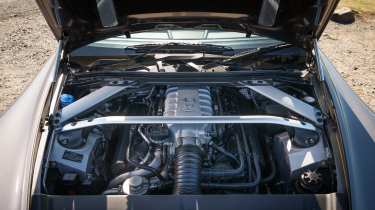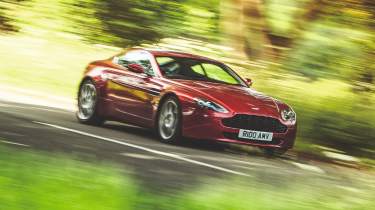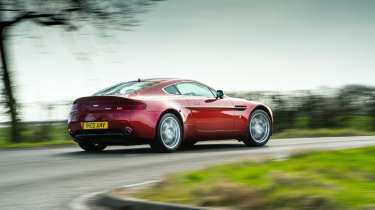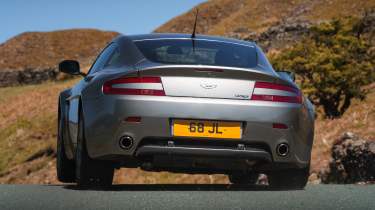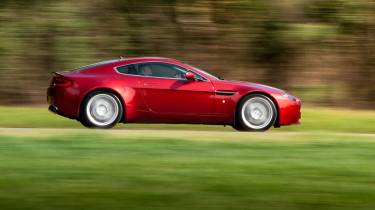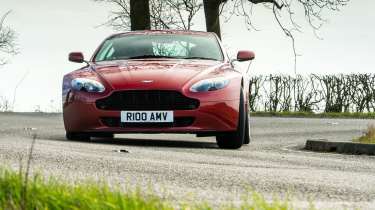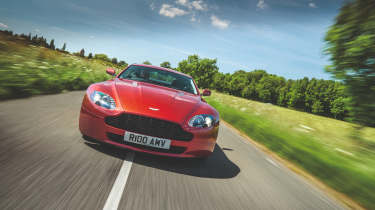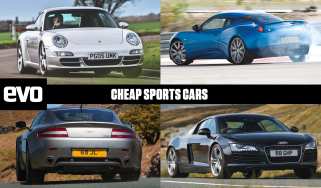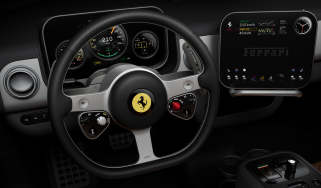Aston Martin V8 Vantage (2005 - 2017) – Aston’s ‘baby’ aimed squarely at the Porsche 911
The so-called ‘baby Aston’ was always punchy but got better and better over the years. It's now a sorely tempting used prospect
As it rumbled towards retirement, the Aston Martin V8 Vantage felt increasingly detached from its ever-more advanced and capable opposition, for better and worse. It is an unashamedly old-school car, and while that sometimes held it back in contemporary group tests, the tide has turned and now the V8 Vantage feels wonderfully pure and refreshing.
It was the product of a brave new era for Aston, though, which was kicked off by the Vanquish of 2001 with its Lotus-developed aluminium chassis. This led to the ‘VH’ architecture that would underpin first the DB9 and then the V8 Vantage, the baby Aston having the biggest job, namely taking on the 911.
> Aston Martin Vantage (2006) Fast Fleet test – living with a £30k V8 Aston
Low, compact, with beautifully weighted proportions and fine details, the Vantage looked just as good on paper. The Germans must surely have been concerned, especially with ex-Porsche man Dr Ulrich Bez in charge at Gaydon. If not the very greatest, definitely one of the most beautiful performance cars of the 2000s and a sure icon of the moment. Its place was always assured on our evo Eras: the 2000s test.
Engine, gearbox and technical highlights
As with the DB9 it had a transaxle, so the gearbox mass was in the right place, and up front the 4.3-litre V8 engine did the numbers too. It began life at fellow Premier Automotive Group member Jaguar, but only the block was carried over. It was dry-sumped for the lowest centre of gravity and to enable the low bonnet line, and put out 380bhp with 302lb ft at 5000rpm. Considering the extensive use of aluminium, the Vantage’s final kerb weight was a little disappointing at 1630kg, meaning a 997 Carrera was a substantial 215kg lighter.
More reviews
Group tests
Long term tests
Reviews
The V8 Vantage saw continuous development throughout its life, its heady 4.3-litre V8 engine quickly growing to 4.7 litres. It was a car of many iterations, the Vantage, with the N400, N420 and N430 specials demarcating moments of change and increases in focus for the model.
Arguably it was with the Vantage S of 2011 and subsequent Vantage model years, that Aston’s sports car hit its finest form, with its extra power and dynamic enhancements, including a quicker steering rack and larger brakes. With its 4.7-litre engine generating 430bhp, the Vantage S doesn’t grab headlines, but its performance, size and grip work together in supreme harmony. It made good on much of the promise of the Prodrive-fettled car, the N400 and the N420 but was more widely available.
The N430 special edition got sportier both in terms of visuals and equipment, with exterior paint accents that mimic those of the Vantage GT3 racers of the time, along with lightweight forged wheels and carbonfibre interior trim. It certainly looks and feels like a more focused machine, and it’s got rarity on its side with only 150 having been sold worldwide, but it’s not hugely dissimilar to the more plentiful and equally powerful S.
A more intense, exciting and evocative V8 variant came in 2016 in the form of the bewinged GT8, but the Vantage has always been an elegant sporting GT at heart. The final flourish for the VH-era Vantage was the V8 Vantage AMR.
The Vantage was offered with the Sportshift single-clutch auto or a six-speed manual gearbox, the latter rarer but far more involving. While it never did really reach a zenith, Sportshift was upgraded over time with quicker software. Sportshift II, a new seven-speeder, was brought in for the introduction of the Vantage S, courtesy of Prodrive.
Almost all Vantages were available as a soft-top roadster too, Aston’s sports car shirking the more leisurely ‘Volante’ moniker used by its larger grand tourer siblings.
Driving the Aston Martin V8 Vantage
Aston Martin V8 Vantage (2005)
‘It will be a bruising contest and the Aston must land some heavy blows on the 911 if it is to be judged a success. It’s balanced, able and unambiguous. Dynamically less challenging but rewarding. A well-aimed shot.’ – Richard Meaden
Aston Martin V8 Vantage (2009)
‘Prod the starter and the V8 barks into life; once you’re on the move it will also bellow gloriously every time you wind the revs above 4000rpm. If we’re being picky then the gearshift is not the best and there are times when the chassis doesn’t feel completely keyed into the tarmac, but the front-engine/rear-drive layout ensures you’re never short of cornering options.’ – Roger Green
Aston Martin V8 Vantage N420 (2010)
‘There’s good detail through the well-weighted steering and despite the firmer springs the ride is still comfortable. It can feel stiff laterally and a little choppy over lumpy B-roads, but there’s plenty of poise and grip in the corners. Pushed really hard it can feel rather elastic beneath you but if you’re up for it the set-up allows you to work the rear tyres up to and over their limit with decent confidence.’ – John Barker
Aston Martin V8 Vantage S (2011)
'As in the V12 Vantage, you play gently with the grip on the front end through long, fast corners, although with less weight in the V8’s nose, it adjusts and reacts more quickly. It’s a car that makes you want to drive, and then keep driving. The engine seems to have been unshackled too. With shorter gears it always seems to be eager to rev, spinning up easily and encouraging you to just keep accelerating or overtaking.
The ride is firm and controlled, which I like, but not harsh. The one small fly in the ointment is the way the gearbox changes up. Pull back on nicely weighted right-hand magnesium paddle and, even in Sport mode, the ECU dictates how fast the gearshift is depending on where you are in the rev range.
Not a problem if you are changing on the limiter on track, as the shift is banged through brutally fast. Change at 5000rpm and there’s a niggling pause-engage, which just interrupts the flow on road and isn’t what we’ve come to expect from the best paddleshifts. The brakes start fading a bit after three or four rounds on circuit, but ease the pace sympathetically for a lap (concentrate on going sideways instead of quickly) and they come back nicely’ – Henry Catchpole, evo 156.
Aston Martin V8 Vantage AMR (2017)
‘In many ways it drives in the manner its beefy but elegant looks suggest, with a reassuring weight to all the controls that’s complemented by a really ‘mechanical’ sense of tactility. And then there’s that V8, slightly sluggish at low revs and soft on response at the top of the accelerator pedal’s long travel, but hugely keen over 4000rpm whereafter it closes in on the limiter with that characteristically hysterical wail. It might not be the quickest way to get from point to point, but it’s definitely one of the more enjoyable ones.’ – Adam Towler.
Aston Martin V8 Vantage: evo Eras test (2025)
‘It looked clean and stylish at the time but the Vantage is one of those cars that looks even better today, and that class extends to the interior. Turn the key, press the starter button and the V8 fires up with a much stronger, American-style rumble than I remember.
‘Dynamically, there’s a smooth, high-quality feel to the way the Vantage conducts itself, the hydraulic steering direct and with a lovely heft to it, the car settling quickly into a lovely flow that’s perhaps more GT than sports car in its suppleness. The gearing feels long too, though this might be because the V8 isn’t over-endowed with torque, 302lb ft sounding like enough but feeling thin after a run in the 997 (295lb ft), the higher kerb weight blunting the Aston’s edge. The later 4.7 rebalanced the equation. It’s a lovely thing, though.
‘Dickie, a self-confessed Aston Martin fanboy, is smitten. ‘I love the Vantage. God it looks good, and it’s such a great car, just the right size. The early Vantage is the closest anyone has come to really taking it to the 911. They’re quite different in the way they drive, but their objectives and their appeal and the target audience, they’re aiming at the same person aren’t they? I love the interior.
'The craftsmanship and the effort are very visible, it’s really special. They always did lack a bit of torque, but when you rev it, it still feels pretty impressive. And it feels sharp and is amongst the more contemporary-feeling cars in this group, the way it steers and attacks a corner. It made a really big statement and it still makes that statement today.’
‘James is charmed, too. ‘What a lovely car. The buried-in-the-car driving position makes it feel really distinctive and the handling is so stable and friendly. It’s less fussy than later Astons and still feels really special. Out of the three sports cars, Vantage, 911 and R8, I’d find it hard to pick a winner. I’d be very happy to own any of them – each has its own strengths.’
‘I agree but I wouldn’t have any trouble choosing a winner, not that this is any sort of group test. And before you go jumping to conclusions, it’s not the 911.’ – John Barker.
Living with the Aston Martin Vantage
Barely a month into Aston ownership and the first major expense hit: a not inconsiderable four grand. Ooof. Didn’t see that coming. Not really the Aston’s fault, to be fair. Thing is, Mrs T had long been hankering after a Fiat 500 Convertible, and after she’d agreed to me getting my own actual Aston Martin there was really no way I could refuse her a Fiat. So we now have the two most impractical cars in the road. The dog isn’t impressed, I can tell you.
The Aston itself hasn’t cost a penny so far – beyond the purchase price, road tax, insurance and fuel. So, how much do these things cost for an early Gaydon-era V8 Vantage?
I bought the Aston in one of those It’s Now or Never moments. In short, I was about to hit the big 6-0 and needed cheering up, and as I’d recently inherited a bit of money, I decided an Aston was the answer. At the time you could find very presentable V8 Vantages for between £25k and £30k (they’ve moved up a bit since then) but these were usually private sales and I wanted the reassurance of buying from a specialist. Which led me to McGurk Performance Cars in Warwickshire and this January 2006 Vantage in Toro red, which I picked up for £32,500.
One bonus with a really early Vantage is that the road tax is £340 a year (had it been registered after 23 March 2006 it would have been £600). Another pleasant surprise was that insurance was just £236 a year for myself and Mrs T on an Admiral multi-car policy, though the excess is a fairly chunky £600 and do keep in mind that we’re both damn near pensionable.
You don’t buy a Vantage for its fuel economy. Most owners reckon on getting anything between mid-teens when they’re enjoying themselves and early 20s sitting on the motorway, so the average of 19.5mpg over the first 1000 miles or so feels about right. Were you to cover 3000 miles a year (which isn’t untypical) that would work out at around £1000 a year for fuel. Most specialists suggest budgeting the same again for routine servicing and the usual expendables.
Speaking of which, the tyres could really do with replacing. They’re original-equipment (OE) Bridgestone Potenzas, which don’t have the best reputation for ride or handling, and though there’s a decent amount of tread left, a check of the manufacturing date on the sidewalls reveals that the fronts are five years old and the rears a positively geriatric eight years old. Though there’s no sign of perishing, that’s really pushing the upper limit of healthy tyre life and may well be contributing to a rather brittle secondary ride. The favourite replacement among other owners seems to be Michelin’s Pilot Sport 4 S, but Bridgestone’s recently launched Potenza Sport has been getting some good notices. I’m hoping evo’s tyre test will help me decide which way to go.
Also on the to-do list is to investigate an upgrade for the infamously woeful factory-fit satnav. It was some way off the pace when the car was new, so 15 years later the pop-up screen remains firmly stowed and the iPhone does nav duties instead. I’ve heard good things about a company called Aston Installations, who cleverly adapt the electrics so that you can run Apple CarPlay via the existing screen, so that’s one avenue to explore.
In the meantime I’m thoroughly enjoying the early months of Aston ownership. The V8V is spared daily duties. I’ve no doubt it would take them in its stride, but I’m still at the point where I’m nervous of leaving it anywhere it might possibly pick up dings in those exposed flanks. So it’s special days out, including joining around 700 other Astons at the AM Heritage Festival, visits to family and friends, and the occasional early-morning or late-evening blat around the local lanes. They’ve never sounded better. – Peter Tomalin, evo issue 289
Prices and buying guide
The Vantage was a car that got relentlessly nipped and tucked over the course of its lengthy production run, so the later the car you get, the more refined it’ll be, with more of the finer issues of the original ironed out. Conversely, the earlier (and leggier) you go, the cheaper the price of entry (as low as £20k), albeit with extra caution advised.
The Vantage S represents great value from around £45,000 – more certainly than the very cheapest 4.3s but equivalent to or cheaper than some of the rarer specials with which it evenly compares and is certainly more readily available. The 2012 update carried over most of the revisions from the Vantage S, with a meaningful price reduction at the time – they’re cheaper now too, priced from around £40k.
Cars from 2016 onwards saw the baby Aston gain a new Vanquish-inspired dashboard with a far neater control suite and a slicker (for an Aston) infotainment system. Needless to say these rarer cars from the tail end of the V8 Vantage’s tenure command a premium. At every level of prospective Vantage ownership, you’ll pay less for the less desirable, more numerous Sportshift examples compared to an equivalent manual. The premium is worth it.
Whichever model you choose, the Vantage has proved to be reliable if maintained properly. The engine is as tough as it sounds and both gearboxes are more than up to the job of handling the V8’s outputs, though be sure to be aware of how much clutch life is left, especially on Sportshift cars. The extruded aluminium chassis isn’t prone to rust either, although the steel rear subframe can corrode. A Vantage in rude health, particularly with the manual ’box, emanates exactly the kind of noise, beauty and interaction that defines the greatest Aston Martins, making it a hugely desirable used choice.
Aston Martin V8 Vantage specs
| V8 Vantage (2005) | V8 Vantage S (2011) | |
|---|---|---|
| Engine | V8 4280cc | V8, 4735cc |
| Power | 380bhp @ 7300rpm | 430bhp @ 7300rpm |
| Torque | 302lb ft @ 5000rpm | 361lb ft @ 5000rpm |
| Weight | 1630kg | 1610kg |
| Power-to-weight | 233bhp/ton | 271bhp/ton |
| 0-62mph | 5sec | 4.8sec |
| Top speed | 174mph | 190mph |
| Price new | £79,995 (2005) | £102,500 (2011) |
| Price today | From £22,000 | From £30,000 |
